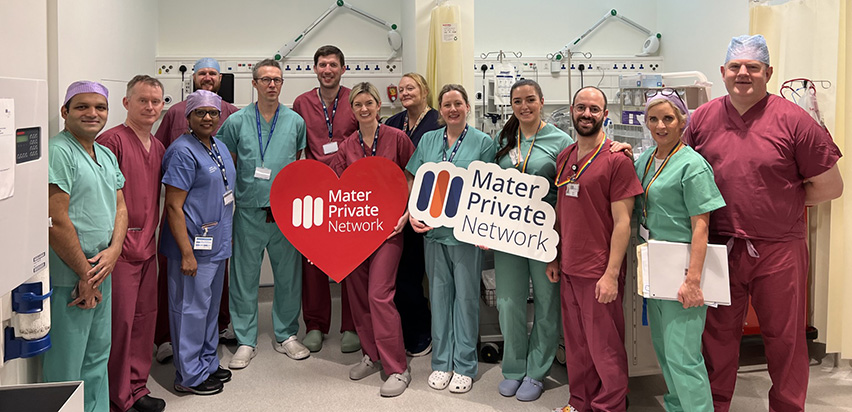Heart Failure and CardioMEMS™
Contact Us
Please note a referral letter is required before an appointment can be confirmed.
Useful Information
About heart failure
Heart failure (HF) is a common condition that results from damage to the heart. This damage makes it difficult for the heart to pump enough blood to your body. Often heart failure is a progressive disease that gets worse over time. Historically, heart failure has been one of the most common reasons for hospitalizations in people over 70 years of age.
If a patient is diagnosed with heart failure, a doctor may monitor his/her weight and blood pressure or prescribe several different medications.
CardioMEMS™ at Mater Private
The Mater Private is the only hospital in Ireland to participate in the CardioMEMS™ study. Five patients with heart failure have been selected to take part.
CardioMEMS™ is a new tool that will help your heart failure doctors understand your pulmonary artery pressures (which are reflecting your heart failure condition) are responding to different therapies, such as medications, lifestyle changes.
The CardioMEMS™ heart failure system features a sensor that was designed to measure and record the pressures in your pulmonary artery (PA). Studies show that PA pressure is a good indicator of worsening heart failure and patients whose clinicians used the CardioMEMS™ heart failure system had fewer hospitalisations than patients who had not.
The heart is a muscle that pumps blood throughout the body. It has four chambers. The upper chambers are called atria (left and right) and the lower chambers are called ventricles (left and right). The right side of the heart receives “used” blood coming back from the body and pumps the blood to the lungs, where it picks up oxygen. Blood then returns to the left side of the heart, which in turn pumps the blood to the rest of the body.
Heart failure is a condition in which the heart can’t pump enough blood to meet the body’s needs. In some cases, the heart can’t fill with enough blood. In other cases, the heart can’t pump blood to the rest of the body with enough force. Some people have both problems.
Heart failure affects about 90,000 people in Ireland, with 10,000 new cases diagnosed every year.
Heart failure has many underlying causes. Coronary artery disease (CAD) causes about half of all HF cases. CAD is a disease of the arteries that deliver blood to the heart muscle to keep it working and healthy. Another common cause is untreated high blood pressure (hypertension), which can make the heart work harder to do its job. Other root causes include persistent abnormal heart rhythms (such as atrial fibrillation), heart valve disease, congenital heart disease, diabetes and infections of the heart. In many cases, the cause is unknown.
The symptoms of heart failure may be mild or severe depending on the extent of damage to your heart:
- Fatigue, loss of energy
- Shortness of breath
- Weight gain
- Swelling
- Loss of appetite or bloating sensation
- Decreased urination during the day, increased urination at night
By managing heart failure, a patient can decrease the impact it has on your daily life.
Making changes in food selections and daily activities, taking the medications the doctor prescribes, and measuring the PA pressures can all make a major difference in how a patient feels.
Drugs are important in the treatment of heart failure. Many research studies have proven that heart failure medications can help you:
- Live longer
- Have fewer symptoms
- Increase your activity level
- Have more energy
- Experience less swelling
- Breathe more easily
- Stay out of the hospital
If you, or someone you know experiences chest pain, palpitations, breathlessness or are worried about your heart we are here to take care of you.
Call 1800 247 999 to speak to one of our cardiac nurse specialists.
If you wish to book an appointment with one of our consultant cardiologists please call 1800 80 42 22.
If you call before midday we’ll offer you a same day appointment and if you call after midday, we’ll offer you an appointment for the next day. Access is by GP referral only.











